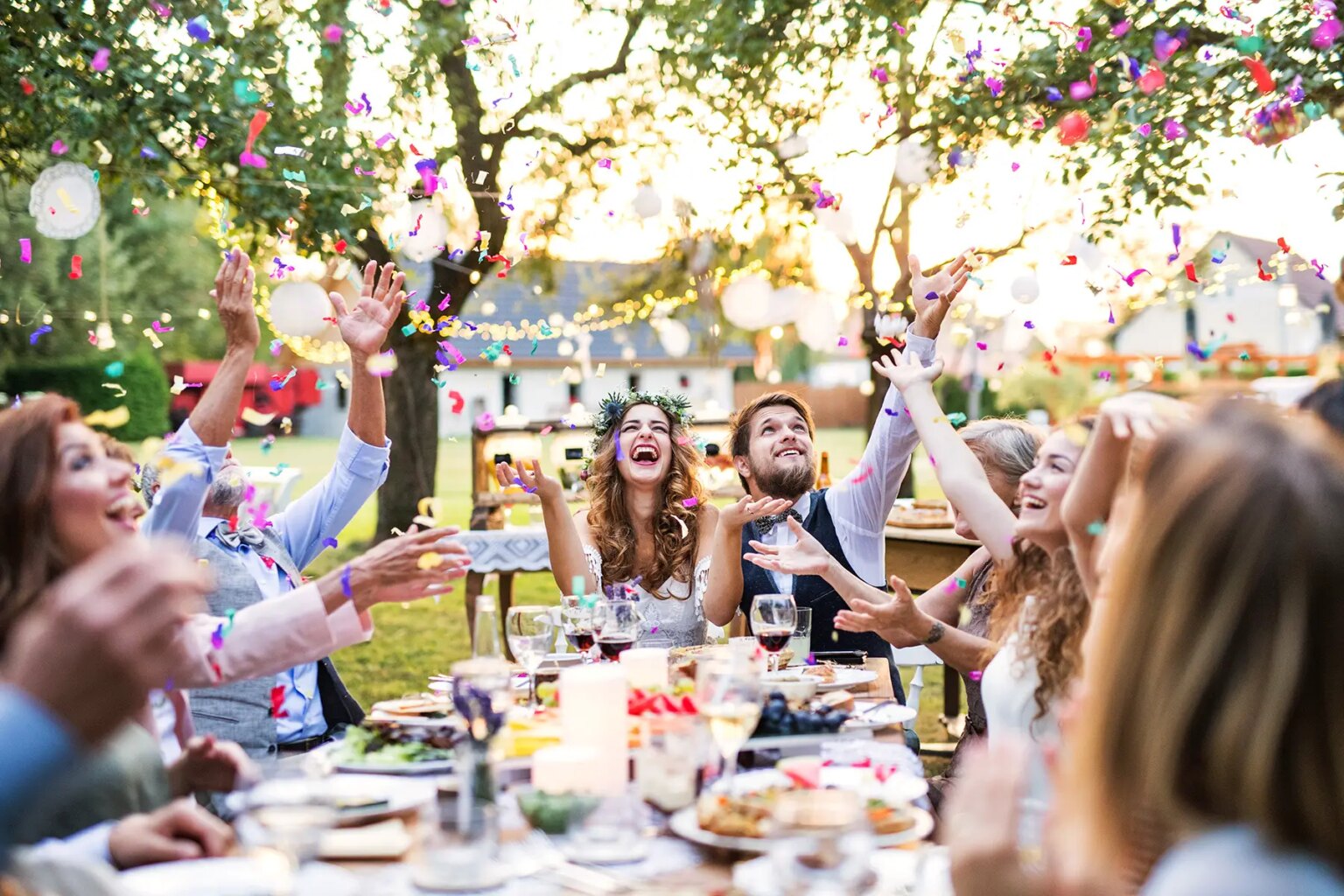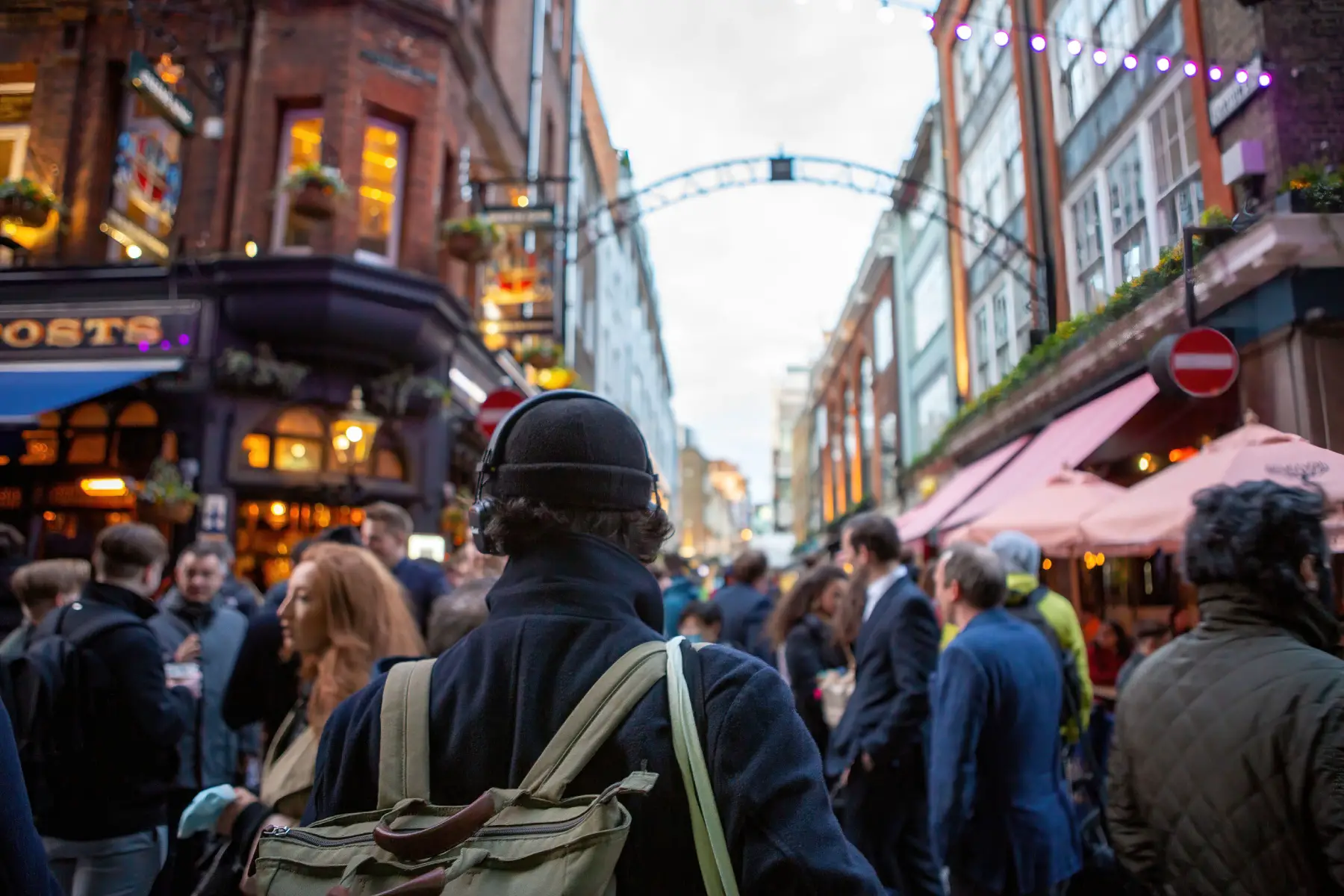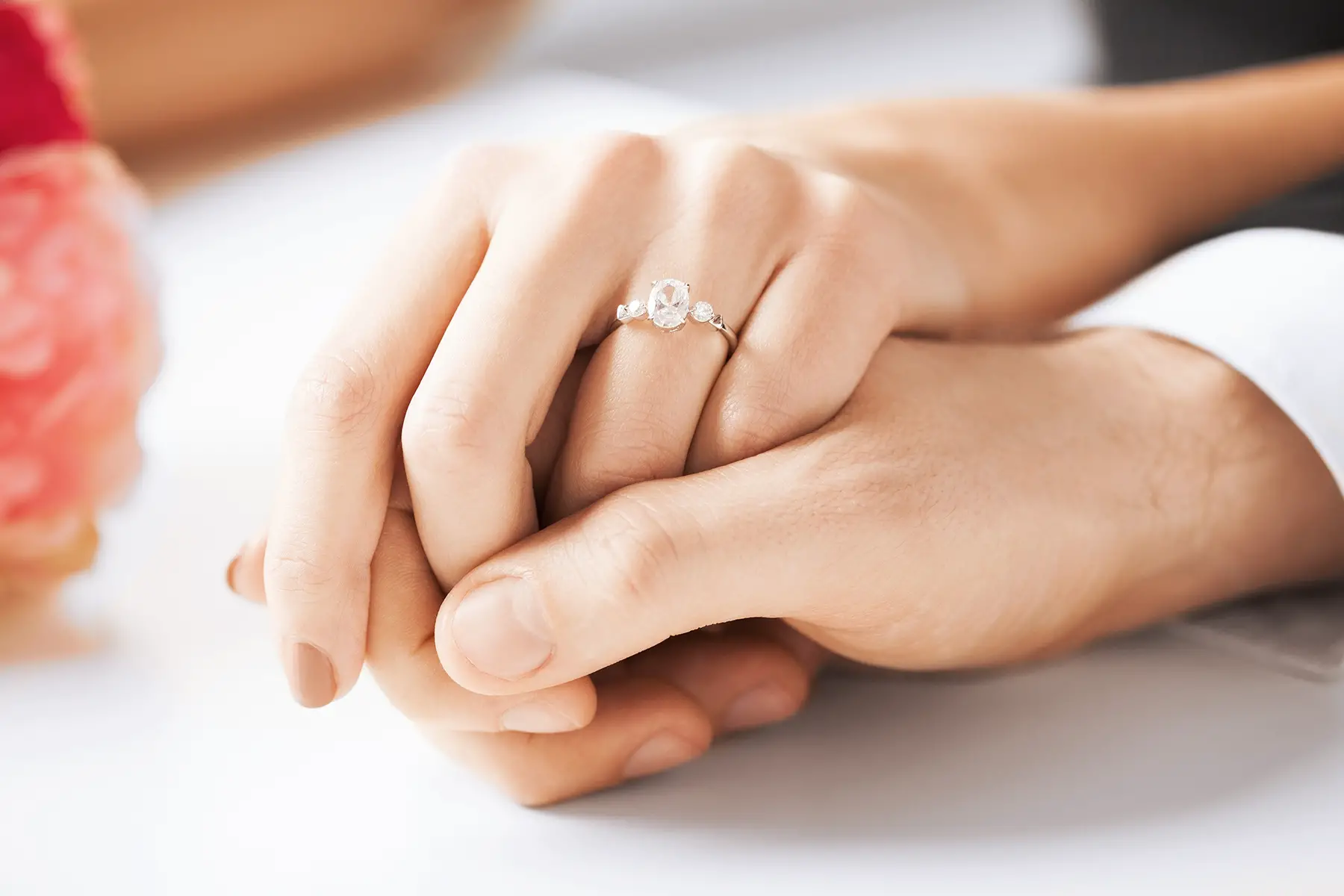Marriage remains a popular custom in the UK. Many couples spend a lot of time – and money – preparing their wedding day. While you may want to go the traditional route, there is also plenty of scope to include your own ideas and personality into your big day. In any case, there are certain legal formalities you must follow.
If you’re getting married in the UK as an expat, here’s what you should know:
- An overview of marriage in the UK
- What types of weddings are possible in the UK
- Gay marriage and same-sex partnerships in the UK
- Civil/domestic partnerships in the UK
- The legal requirements for getting married in the UK
- Wedding planning in the UK: step by step
- The cost of getting married in the UK
- The best wedding locations in the UK
- Wedding traditions and customs in the UK
- Useful resources
Cigna Global
Enjoy peace of mind while living in the UK with Cigna Global’s long-term international health insurance plans (12+ months). Get tailored coverage, direct billing with many providers, complex case management, and global care on demand, with access to a network of 1.5+ million doctors, specialists, and therapists.
An overview of marriage in the UK
Marriage has existed in all parts of the UK for centuries. However, formally registered marriages only began with the 1753 Marriage Act, stating that a religious minister should conduct ceremonies. Today, there are various kinds of weddings in the UK, including religious weddings, civil weddings and same-sex weddings.
The number of overall marriages in the UK has been steadily decreasing since the 1970s. There were 234,795 weddings in England and Wales in 2018, the lowest number since 2009 and the lowest between opposite-sex couples since records began. According to 2016 figures, there were 4.4 marriages per 1,000 inhabitants per year in the UK, the same as the EU average.
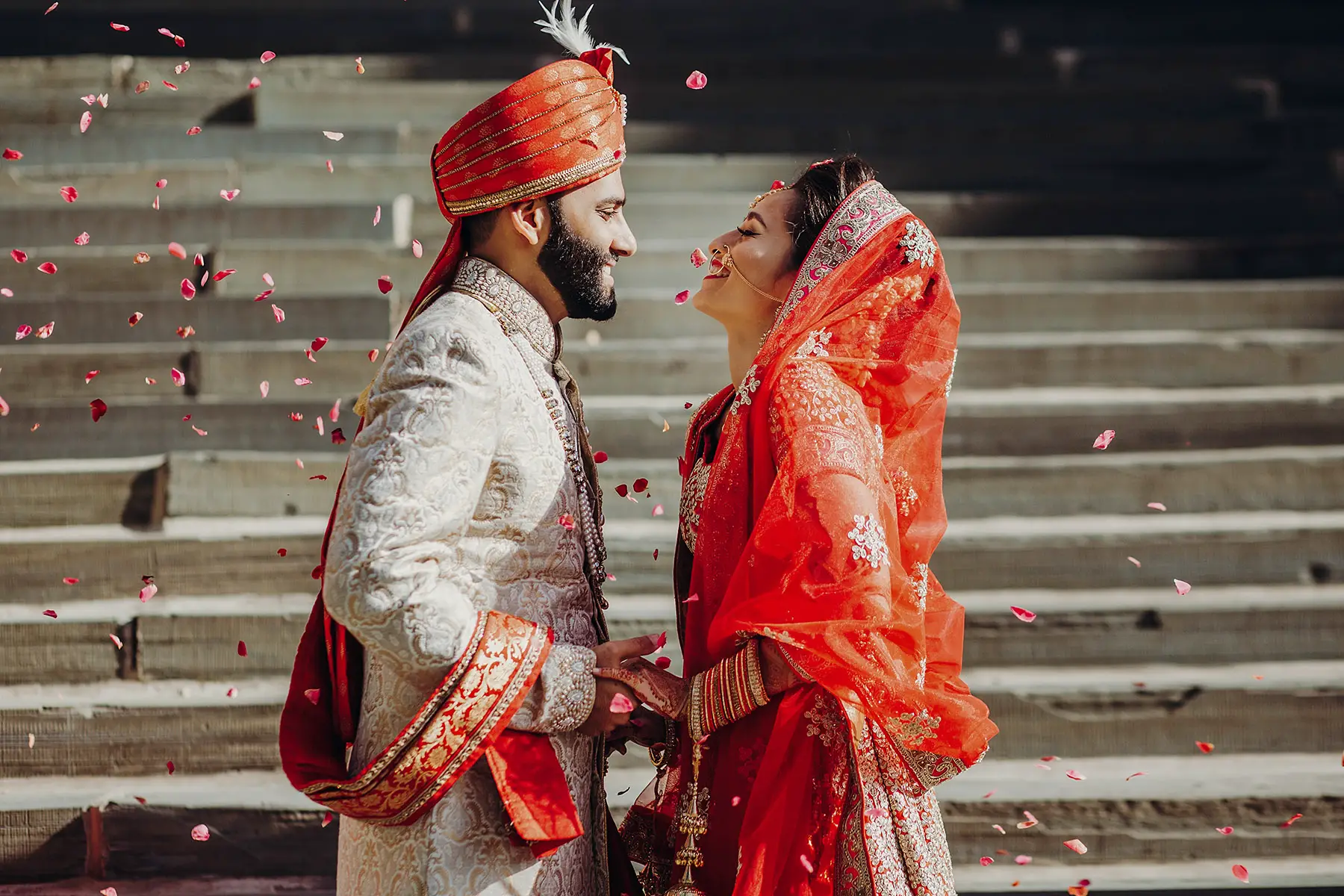
At the same time, the average age at which people are getting married in the UK has been slowly increasing. Over the past 50 years it has increased from 27.2 (in 1969) to 38.1 (in 2018) for men and from 24.8 to 35.8 for women.
According to 2020 statistics for England and Wales, just over 40% of the adult population is married. This compares to around 47.5% who are single, 6% divorced, 5% widowed, and less than 1% in civil partnerships.
Changes to laws in recent decades now mean that there are fewer distinctions between married couples and cohabiting partners. In general, married couples have more legal rights, especially regarding rights to each other’s property. For example, a widowed spouse will automatically inherit a proportion of the deceased’s estate if there is no will. There are also certain tax benefits such as the Marriage Allowance.
Attitudes towards getting married in the UK
Although getting married in the UK is still popular, its importance has been steadily decreasing as society shifts away from traditional ways of living and toward modern approaches. This is evident not only in the declining numbers of people marrying but also in public attitudes.
The idea that couples could live together long-term and never marry, once seen as controversial, is now the norm. In the 2014 British Social Attitudes survey, 74% now believed there is little difference between marriage and living together. This was up from 66% in 2006.
There has also been a shift in the types of marriage ceremonies. Whereas religious ceremonies were once predominant, there were nearly four times as many civil ceremonies as religious ones in England and Wales in 2018.
Furthermore, attitudes have changed toward same-sex marriages. According to the 2016 British Social Attitudes survey, 64% of people now accept same-sex relationships compared to 10% in 1987. The percentage of Christians accepting same-sex relationships has jumped from 35% to 56% since the legalization of gay marriage in the UK in 2013.
What types of weddings are possible in the UK
There are essentially two main types of weddings in the UK: civil ceremonies and religious ceremonies.
Civil ceremonies
Civil ceremonies in the UK can take place at a register office or any approved council premises. They should be conducted by a licensed registrar, whom you need to book in advance. You will also need two people to sign the marriage papers as witnesses. You can include vows and readings at civil ceremonies, but there should not be any religious content, for example readings from scriptures.
Around 82% of weddings in England and Wales were civil ceremonies in 2019.
Religious ceremonies
Religious ceremonies can take place in any religious building. Or, anywhere as long as it is under a Chuppah in the case of Jewish weddings. A religious minister will typically perform the ceremony; however the minister will need to have a license to register marriages. If not, a civil registrar should be present.
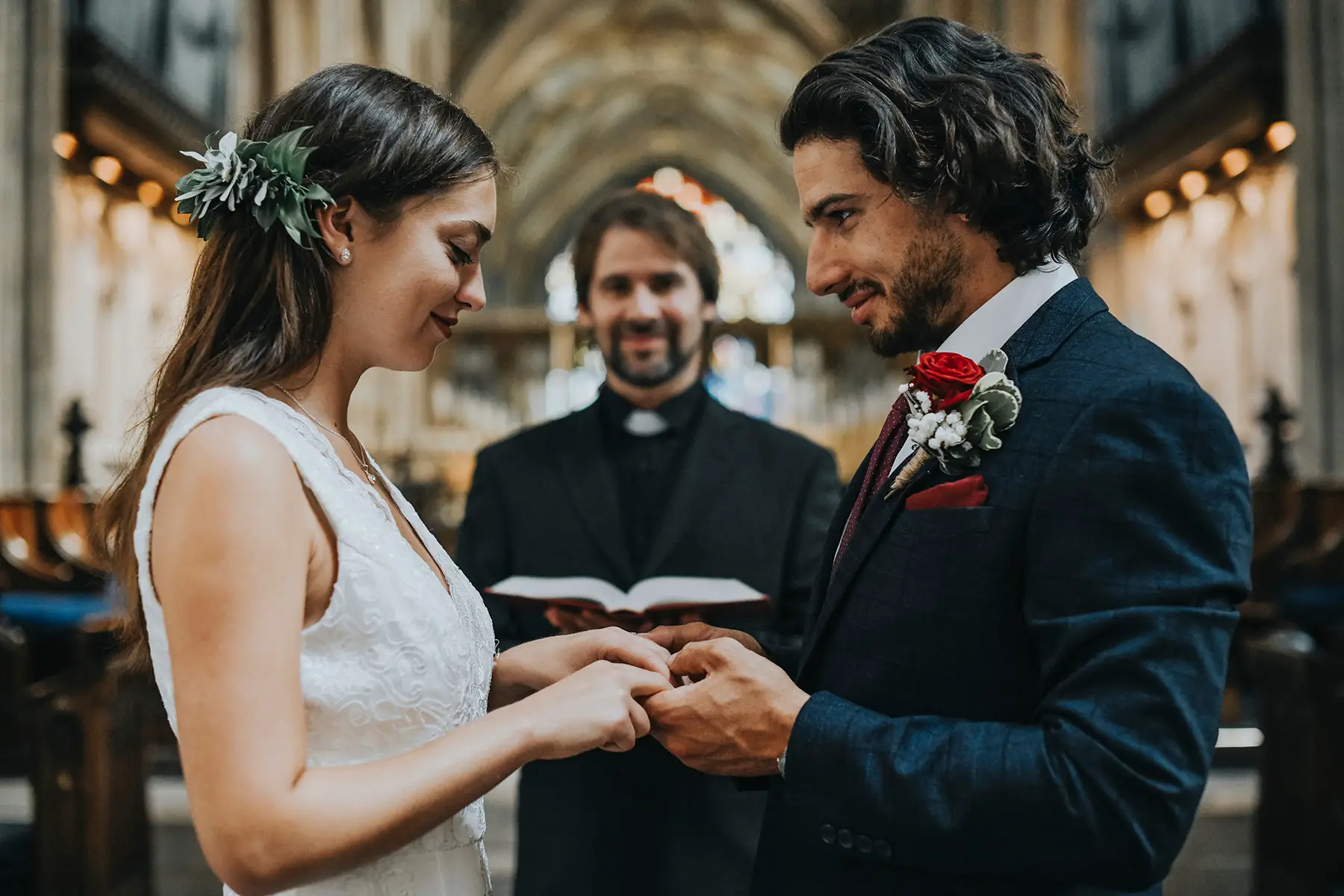
Religious weddings typically follow the format of religious ceremony, including rites and readings, followed by signing of the marriage papers straight afterwards. These types of weddings have declined in popularity over the last few decades, making up just over one fifth of overall ceremonies (20.5%) in England and Wales in 2018.
Gay marriage and same-sex partnerships in the UK
Gay marriage in the UK became legal in most parts in 2013, and the first ceremonies took place in 2014. Northern Ireland legalized gay marriages in 2020. Same-sex couples now have the same legal rights as heterosexual couples across the UK when it comes to marriage.
Religious attitudes towards same-sex marriage have begun to change. Around 56% of Christians reported acceptance of gay marriage in 2016, and religious buildings (apart from Anglican churches) can now hold same-sex weddings as long as they register for same-sex ceremonies.
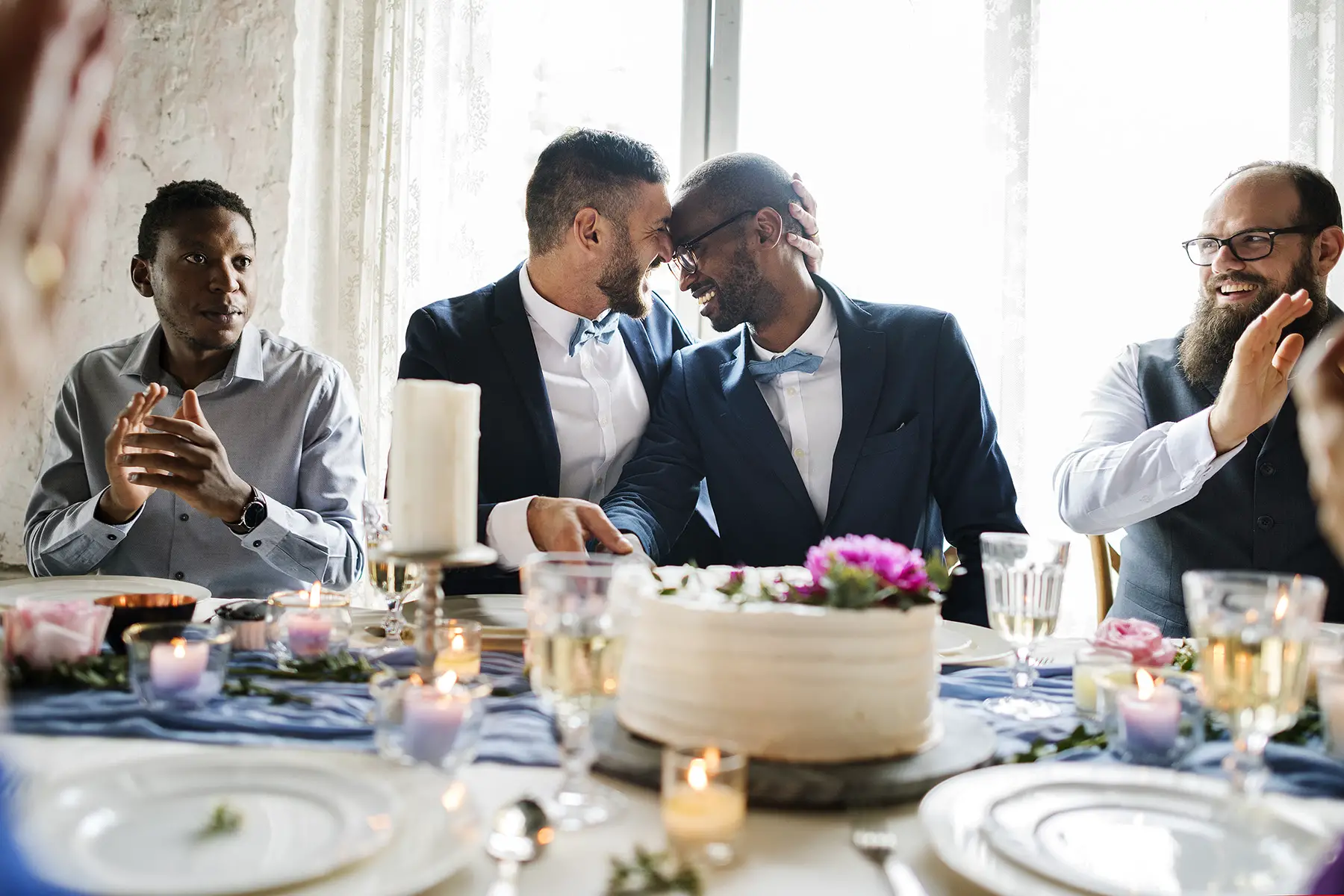
You can convert a same-sex civil partnership into a marriage in England, Wales and Scotland. However, you cannot do this in Northern Ireland. The marriage certificate dates from when the civil partnership began. If you have a same-sex marriage overseas, this will be recognized in England and Wales.
There were 6,295 gay marriages in England and Wales in 2018, which made up nearly 3% of all marriages that year.
Civil/domestic partnerships in the UK
Civil partnerships in the UK began in 2005 as a way for same-sex couples to legally recognize their relationship. Following the legalization of gay marriage, civil partnerships were extended to opposite-sex couples in 2019 as an alternative to getting married in the UK.
There are few differences between a marriage and a civil partnership in the UK, in terms of requirements, rights and processes. The key differences concern the formalities on the day. Civil partnerships are similar to civil weddings. The couple must sign a partnership document along with two witnesses. In contrast to weddings, there are usually no vows. However, those entering a civil partnership can choose to add a ceremony, or even a religious blessing, if they wish.
Civil partnerships can take place in a registry office or any council-approved premises. Religious buildings can choose to host civil partnership ceremonies if they want to. Same-sex couples can convert their civil partnership into a marriage; however heterosexual couples cannot.
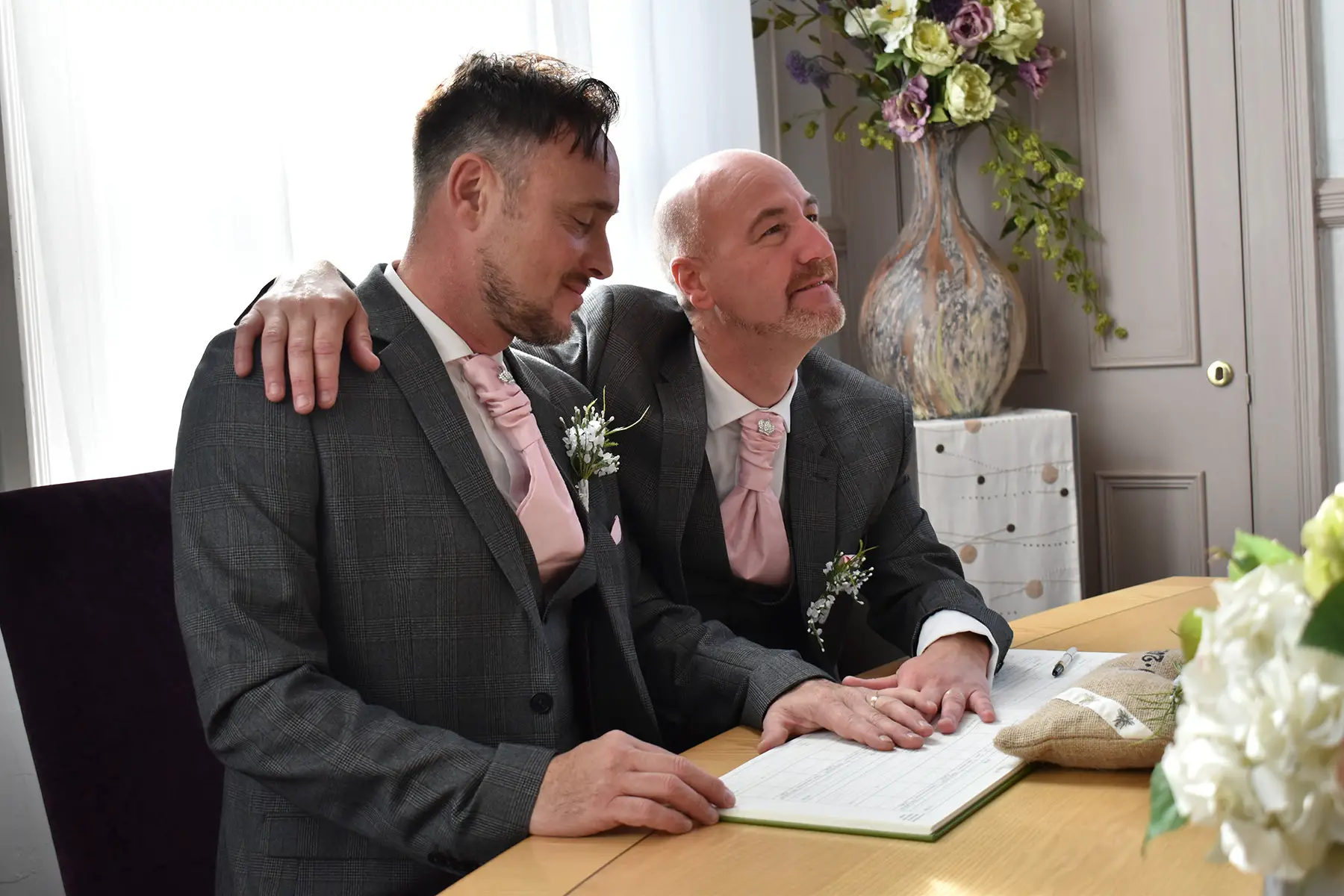
If a couple wants to end a civil partnership, they need to apply to the court for a dissolution, but the relationship needs to have lasted for at least a year.
129,171 adults in England and Wales were in a civil partnership in 2020, which is around 0.2% of the overall population.
The legal requirements for getting married in the UK
Requirements and rights in the UK
Anyone can get married in the UK as long as they are:
- Aged at least 16 (those under 18 in England and Wales will need the consent of a parent or guardian)
- Not already married or in a civil partnership
- Not closely related (you cannot marry parents/children, grandparents/grandchildren, siblings or half-siblings, or adopted children)
If you are not a UK citizen or permanent resident, you may need to apply for a UK visa to get married in the UK. This will be a marriage visitor visa if you’re staying in the UK for less than six months, or a family visa if you plan to live in the UK. Check your visa requirements on the UK government’s website. You can apply for British citizenship if you marry a British citizen and have lived in the UK for at least three years.
A marriage in the UK is valid in most other countries. You should still seek confirmation of this from the embassy of your home country.
Necessary paperwork and documentation in the UK
To get married in the UK, you will typically need to have the following documentation:
- Passport or valid ID that includes details of your name and age/date of birth
- Proof of home address, for example a utility bill
- Proof of any name changes, for example copy of a deed poll
- Decree absolute or final order if you’ve been in a marriage or civil partnership before
- Death certificate for your former spouse/partner if you are a widow
- Proof of current immigration status, along with any required visas, if you are from outside the UK
- Details of where and when you intend to get married
Wedding planning in the UK: step by step
Traditionally, the first step in a UK wedding is for the couple to become engaged. With opposite-sex couples, this is usually done by the man proposing to the woman although this is not always the case – women sometimes propose to their boyfriends, especially on 29th February in a Leap Year.
There is no standard length for an engagement. They can last for anything from a few months to several years. According to the 2021 National Wedding Survey, the average length of an engagement in the UK is 20 months. Couples typically spend their engagement period planning their wedding, although most of the final details are planned within the final six months.
Step one: Book the venue and registrar
Wedding venues can get booked up very quickly, especially in the summer months. This is why you should book a suitable venue as soon as possible. Simultaneously, you’ll need to contact the Registry Office (if a civil ceremony) or religious establishment (if a religious ceremony) to ensure that there is a registrar/minister available on the date and at the needed times. You’ll usually need to provide venue details when you book with the Registry Office, which is why it’s important to find a venue and reserve a date first.
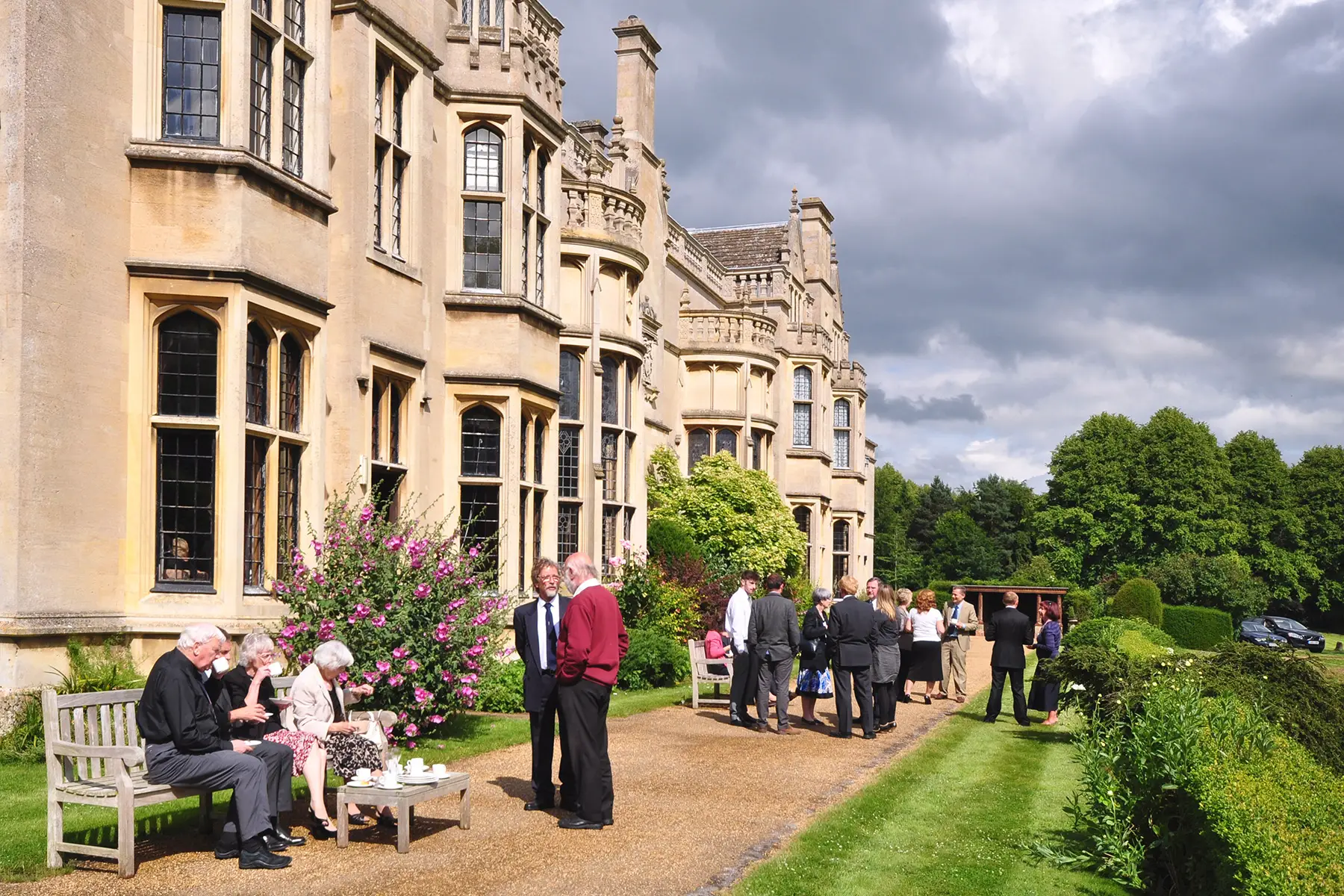
Weddings in the UK are usually in three parts:
- the ceremony, which usually takes place either late morning or early afternoon
- the dinner reception, which is usually mid-afternoon and is when the speeches take place
- the evening reception, which is more of an informal party.
The ceremony and receptions are often in two different venues, although this is not always the case. This means that you may have to search out and book two different venues. Once you’ve booked the ceremony venue, you can take a bit more time deciding on a premises for the reception. However, these venues also get snapped up quickly, so it’s advisable to secure something early on.
Things you’ll need to consider when booking your wedding venues are:
- Cost – how much can you afford?
- Maximum capacity – this will determine your number of guests
- Convenience of location – how easy is it for everyone to reach? If you decide to get married on a remote island, this may affect attendance numbers.
- Accommodation – what are local facilities like if guests need to stay over?
- Catering – some reception venues offer to provide catering services. If not, this is something else you’ll need to consider when planning.
Step two: Plan the big day
Once you’ve booked the venue and registrar, you’ll need to plan out everything else for your wedding day. This is an ongoing process spread across the period between booking the venue and the big day – so usually over around 12-18 months.
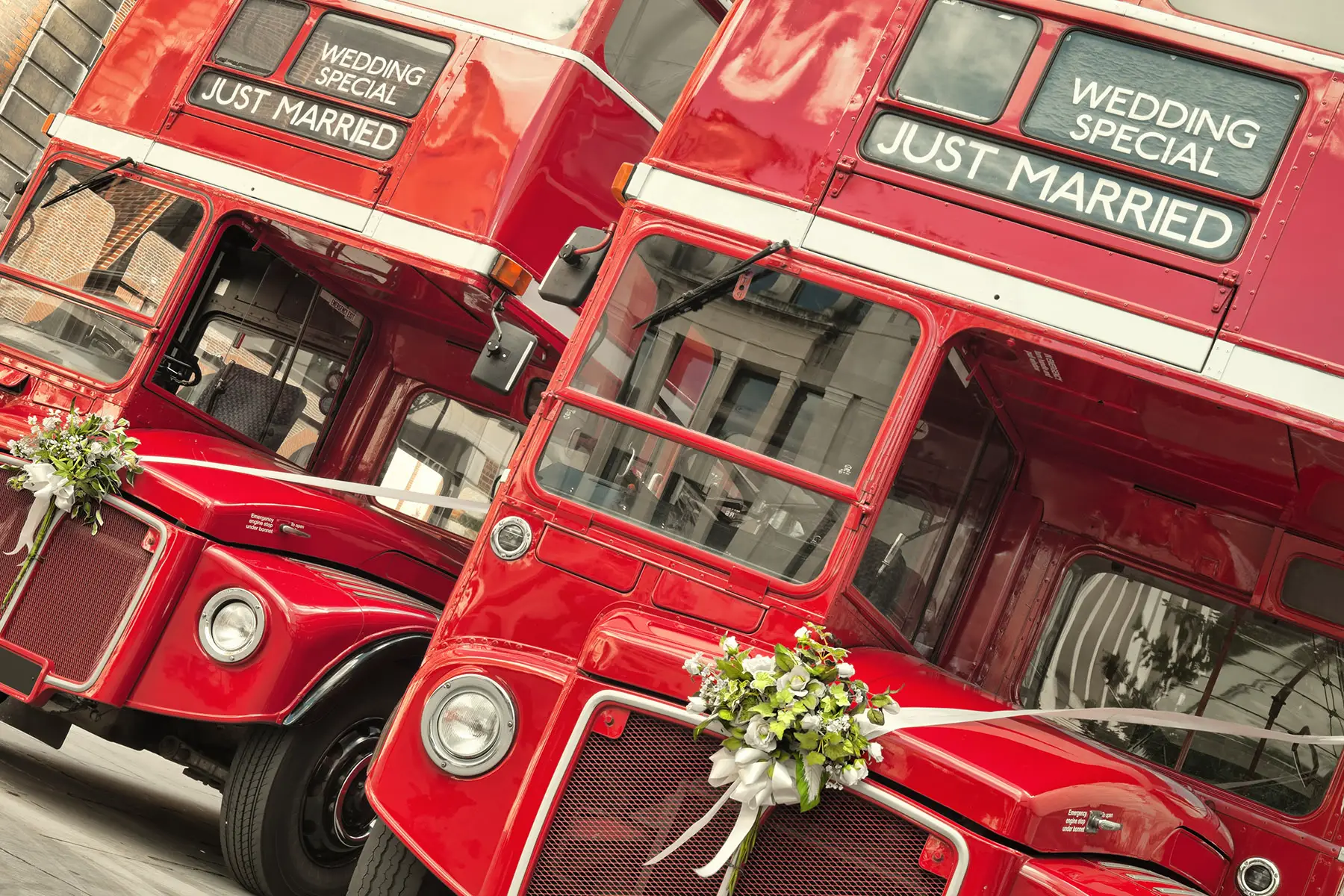
Unless you choose to hire a wedding planner, you’ll need to organize the following yourself:
- Choosing a theme – not all weddings have a theme, but it will determine much of the subsequent planning if yours does.
- Wedding insurance – this isn’t a mandatory insurance in the UK, but many choose to take it out to protect against late cancelation.
- Choose your wedding party – this includes bridesmaids, maid of honor, best man, and any other official positions you wish to fill.
- Sort out your guest lists – most weddings have at least two different lists – one for the ceremony/early reception and one for the evening reception. Bear in mind venue capacities.
- Book your wedding suppliers – this may include photographer, caterers, florist, cake-maker, stationer, entertainment (e.g., DJ or band for evening reception), hair & make-up, wedding transport.
- Sort out formal wedding-wear – wedding dress plus outfits for groom, best man, bridesmaids, etc.
- Buy the wedding rings
- Finalize your schedule for the day – for example, what time you will have the dinner, speeches, evening reception.
- Choose your wedding gift list
- Send out your wedding invites – don’t forget to put an RSVP deadline!
- Make a table plan – you can do this once you have the RSVPs and know numbers.
- Plan your stag and hen parties – usually 3-4 weeks before the wedding.
- Plan the finishing touches – these are things that can be done in the weeks leading up to the wedding, such as choosing any readings and songs.
Step three: Give notice
You must give at least 29 days notice of your marriage at your local Registry Office. This has to be at the office in the area where you live, even if you are getting married in another area. You also need to have been a resident in this area for at least seven days. Both partners will need to do this separately if they live in different registration areas. However, if one partner is not a UK citizen or permanent resident, then the other partner should accompany them to the appointment.
If you are having a religious ceremony in an Anglican Church, you won’t need to give notice, unless you are not a British citizen or permanent resident. This is because the Church is authorized to register marriages on the day after performing the ceremony.
You need to get married within 12 months of giving notice to the Registry Office, otherwise your notice is null and void.
Step four: Get married and get your marriage certificate!
Once the planning is done, all that remains is to get hitched! The registrar – or whoever is performing the ceremony – will talk you through the process beforehand. With religious or lengthy ceremonies, there is sometimes a “dress rehearsal” the day before the wedding. In general, civil ceremonies usually take around 15-20 minutes. Religious ceremonies can be longer.
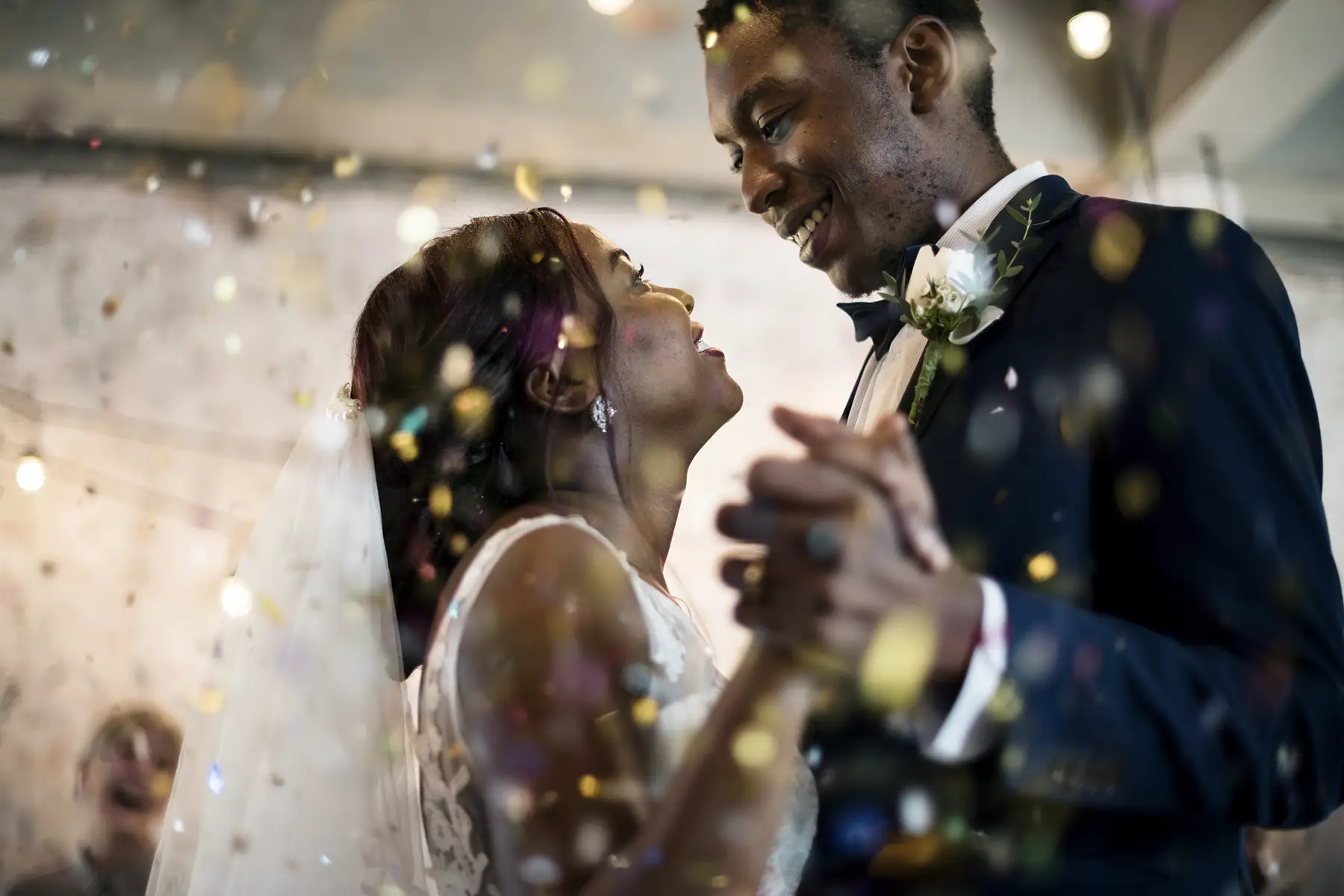
The registrar or minister often meets briefly with each partner individually shortly before the ceremony to check that all is in order. Once all the guests and both partners have arrived, the process typically involves:
- Introduction and readings by the registrar/minister performing the ceremony
- Exchange of marriage vows and wedding rings
- Pronouncement of marriage
- Signing of the marriage register
- Presentation of the marriage certificate (if you have ordered this)
The cost of getting married in the UK
Getting married is an expensive business. This is especially true in the UK, which is one of the highest-spending countries when it comes to weddings. According to the 2021 National Wedding Survey, the average wedding cost in the UK is £17,300, excluding engagement ring and honeymoon costs.
Here is a rough breakdown of average costs:
- Venue – £7,600
- Wedding dress – £1,300
- Photographer – £1,200 (an extra £1,000 if you have a video of the day)
- Groom attire – £500
- Catering – £3,000 to £4,000 total (around £65 per head)
- Drinks – £1,500
- Flower displays – £1,500
- Evening entertainment – £1,000
- Bridal hair and make-up – £150
- Wedding car – £150 to £500
- Registrar costs – £46 for civil ceremony, £86 for religious ceremony
- Notice fees – £35 plus around £50-75 if documents need checking
- Wedding insurance – between £20 and £300 depending on coverage
- Marriage visitor visa – £95 (if required)
- Engagement ring – £2,500
- Honeymoon – £3,500 to £4,500
- Prenuptial agreement – £2,000 (if you have one)
The best wedding locations in the UK
According to Hitched, the most popular wedding venues in the UK by region are:
- Great Fosters, Surrey (South East England)
- Kew Gardens (London)
- Thornton Manor, Cheshire (North West England)
- Boreham House, Essex (East of England)
- The Mill Barns, Shropshire (West Midlands)
- Tunnel Beaches, Devon (South West England)
- Carlton Towers, North Yorkshire (Yorkshire and the Humber)
- Dodford Manor, Northamptonshire (East Midlands)
- Healey Barn, Northumberland (North East England)
- The Shore, Loch Lomond (Scotland)
- St David’s Hotel, Cardiff (Wales)
- Hillsborough Castle, County Down (Northern Ireland)
Wedding traditions and customs in the UK
Wedding traditions vary across each part of the UK. Having said that, there a some distinctly British traditions and superstitions associated with the big day.
These include:
The last night apart
It’s considered bad luck for the bride and groom to see each other on the day of the wedding until they meet at the altar. Because of this, they traditionally spend the last night before the wedding apart.
Something old, something new…
…something borrowed, something blue. Linked to an old English rhyme, the bride will traditionally wear four items to represent past, future, friendship/family ties, and faithfulness.
The bridal veil
Traditional wedding dresses in the UK are white and come with a veil that hangs over the face, said to ward off evil spirits in ancient times. The groom moves the veil aside once the marriage is pronounced so that the couple can kiss.
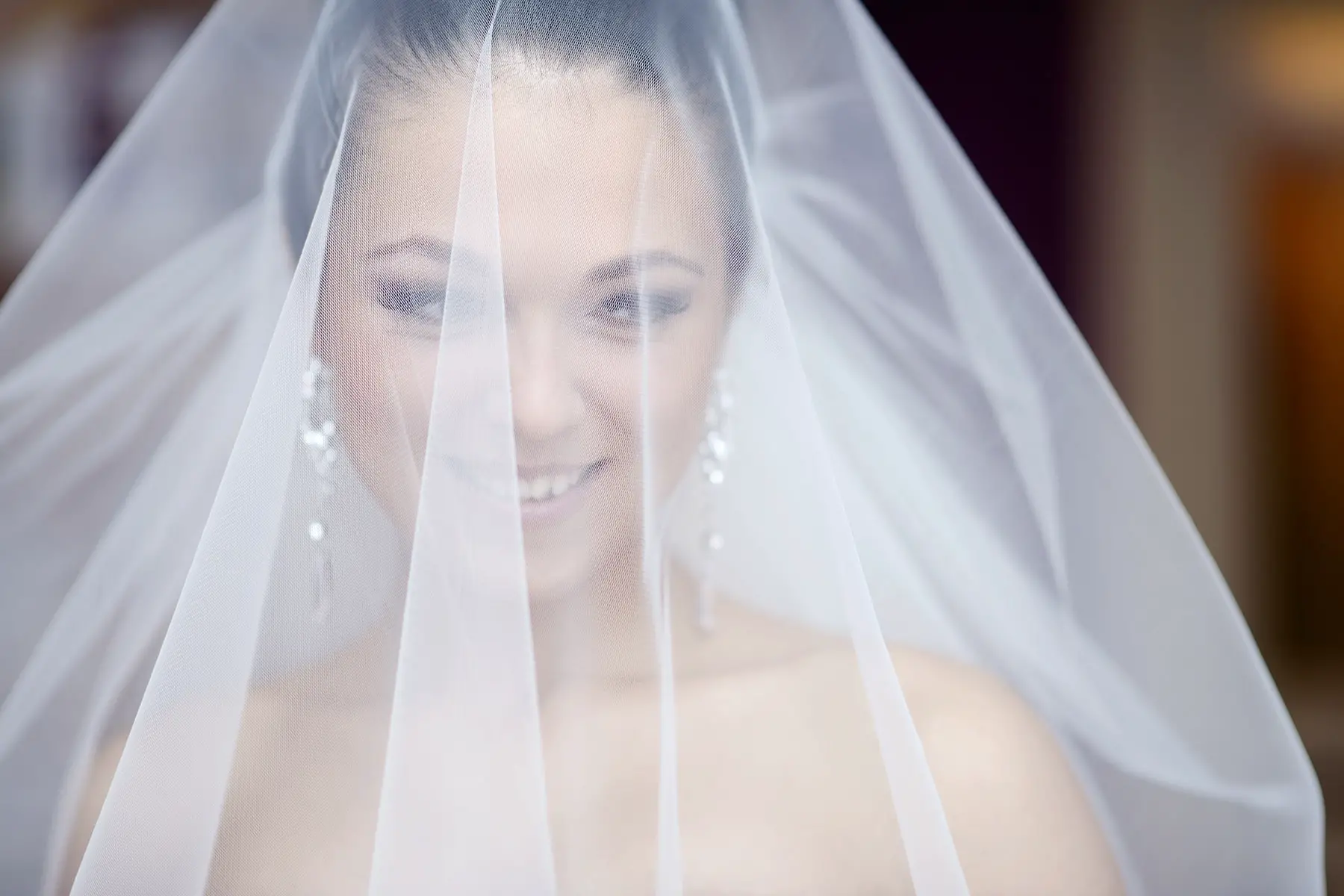
Nowadays, many brides get married in modern wedding dresses which don’t have veils.
At the altar
Traditionally, the groom arrives first and the bride is the last to arrive. The bride is walked down the aisle, usually by her father or another close relative.
At the altar, the bride stands to the left of the groom. This harks back to scarier times when the groom felt the need to protect his bride with his left arm, and use his sword to fight off anyone trying to steal her.
Wedding rings
Wedding rings in the UK are usually gold bands worn on the fourth finger of the left hand. The custom is said to have begun in Ancient Egypt, where the circle was seen as the symbol of eternity. However, some trace wearing the ring on the fourth left-hand finger to the Romans, who believed the vein in this finger ran directly to the heart.
Some believe that it’s unlucky for the bride or groom to try on wedding rings before marriage, and that it’s also unlucky to remove the ring before seven years of marriage.
Throwing the bouquet
It is believed that this tradition originated in France around the 14-15th century. This takes place immediately after the ceremony, when guests gather outside the venue to welcome the married couple. According to the tradition, whoever catches the bouquet will be the next to marry.
The bride carried over the threshold
This tradition dates back to Roman times, when the groom would lift the bride up and carry her across the threshold in order to protect her from any evil spirits or lurking demons.
Sugared almonds
This is a small gift, or favor, given to guests, usually at the reception. Each guest receives a small pouch containing five sugared almonds to symbolize health, death, happiness, fertility, and long life. Some couples substitute almonds for other gifts, for example chocolates or mini bottles of spirits.
Wedding speeches
These are typically from the father of the bride, the groom and finally the best man. However, there may sometimes be additional speeches, for example from the bride or other family relatives.
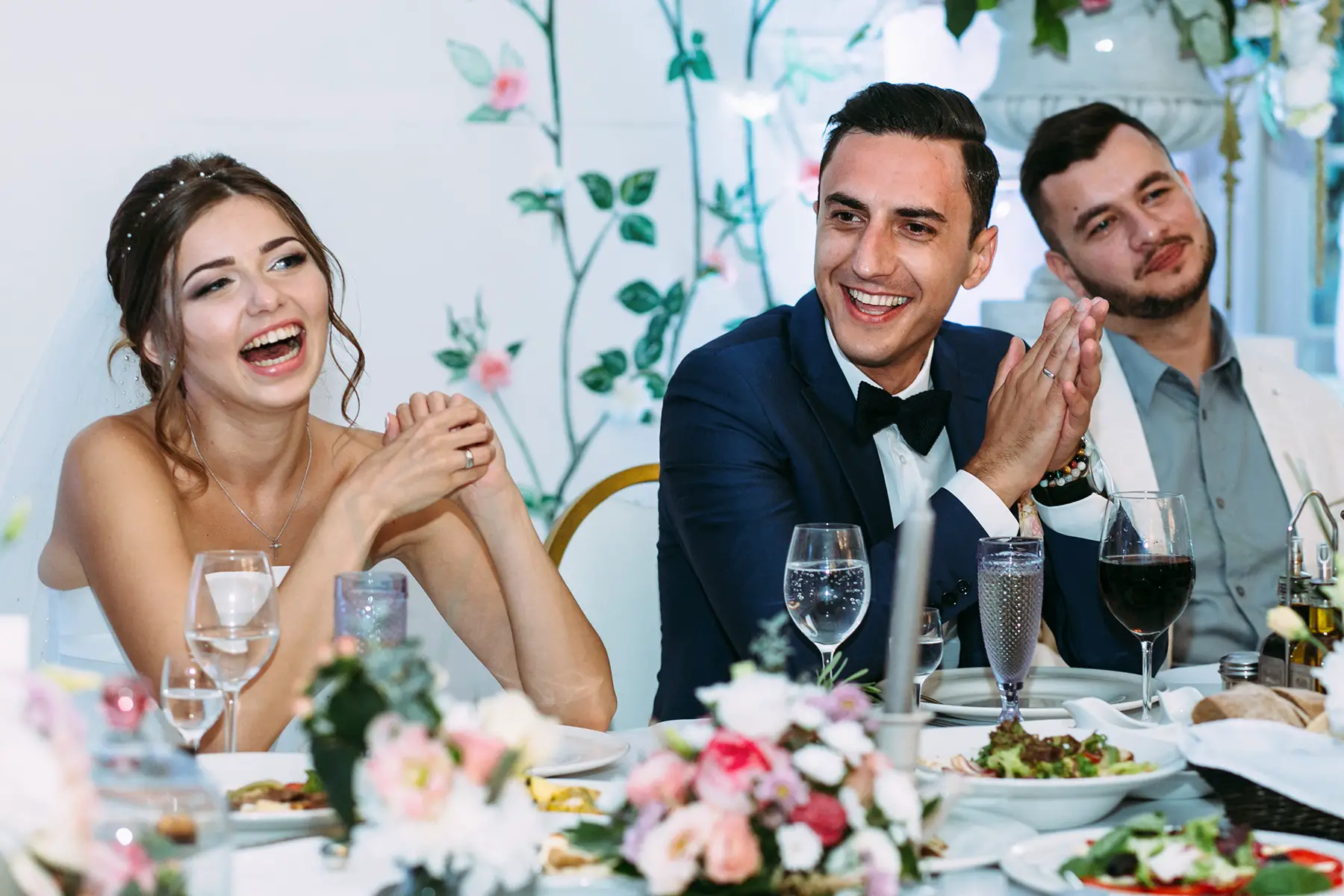
Speeches usually take place during the main reception, either before or after the meal.
The first dance
It is a custom for the married couple to have the first dance when the music starts at the evening reception. This is usually a favorite song of the couple, perhaps the song they fell in love to, or by a mutual favourite artist. Typically, guests will form a circle around the edge of the dance floor while the couple dances, and then join in midway through the song.
It is sometimes customary for the best man to dance to one song with the head bridesmaid.
